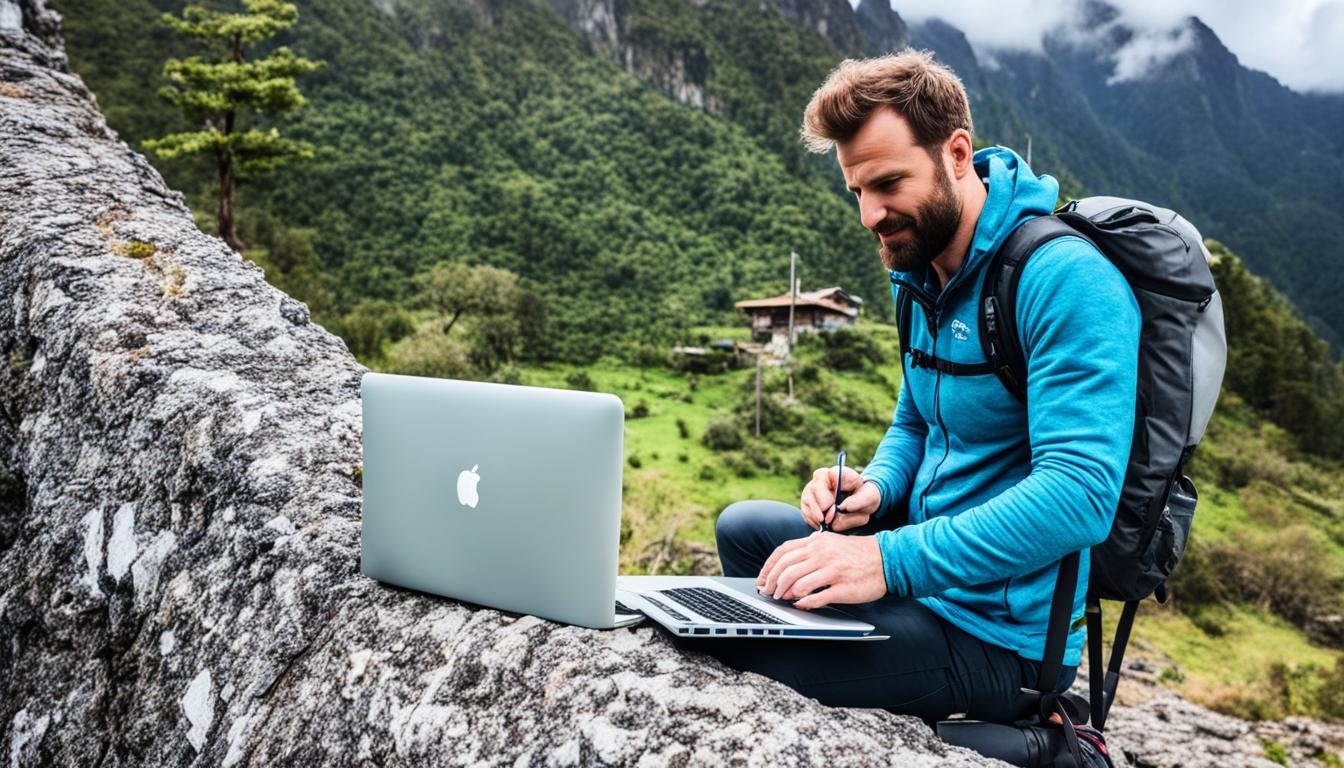Common Challenges of Digital Nomadism and How to Overcome Them
The digital nomad lifestyle is exciting, offering freedom and flexible work hours. But, it comes with its own set of challenges. Digital nomads often struggle with balancing work and life, finding good places to stay, and more.
One big issue is unreliable WiFi and connectivity, especially in remote or less developed areas. Having a steady internet connection is key for staying productive. Another challenge is erratic income streams, since freelance work can be unpredictable.
It’s tough for digital nomads to keep up with social connections. They must make new friends and keep in touch with loved ones back home. Dealing with homesickness or culture shock can be hard because of the constant travel.
Also, the constant change can lead to stress and burnout. It’s important to find ways to handle these emotional challenges. Having the right strategies and resources is key to overcoming these obstacles.
Key Takeaways
- Maintaining a work-life balance is crucial to avoid burnout.
- Choosing the right locations involves considering logistics, infrastructure, and legalities.
- Building and maintaining social connections helps mitigate homesickness and culture shock.
- Managing finances and taxes correctly is vital for financial stability.
- Consistent routines and time management strategies are essential for productivity.
Maintaining a Work-Life Balance
The digital nomad lifestyle lets people work from anywhere in the world. It’s a dream for many, but keeping a balance between work and life is key. To stay productive and enjoy your travels, it’s important to have a routine, a personalized schedule, and manage your projects well.
Creating a Personalized Schedule
Creating a work schedule helps digital nomads balance their time. It’s about fitting in work and personal activities. Knowing when you work best can make you more productive. This way, you can tackle tough tasks when you’re most alert and relax when you need to.
Setting Boundaries
It’s vital to separate work from free time. Digital nomads often find it hard to stop working because there’s always something to do. Setting clear work hours helps you stay focused, lowers stress, and improves your work. Tools like online calendars can help keep your personal time safe.
Pacing Your Projects
Good time management is key for balancing work and life. Tools like Trello, Asana, and Todoist help a lot. It’s important to manage your projects well to avoid burnout. Checking in with yourself and adjusting your schedule helps you stay on track. Focus on what’s most important and avoid doing too many things at once to stay productive and balanced.
Staying disciplined in a flexible routine helps a lot. Using tools like WhatsApp or Slack makes it easier to balance work and life. Being flexible and adjusting to your surroundings and your best work times is important to stay productive while traveling.
Finding the Right Locations
As more people work remotely, picking the right place for work and life is key. Digital nomads face challenges like poor internet, legal issues, and finding good work spots. To succeed, they need to plan and research well.
Logistics and Infrastructure
For digital nomads, having a solid plan for logistics is crucial. A fast and reliable internet connection is a must. Many use portable WiFi or stay in places with great internet.
Coworking spaces are also key. They offer not just internet but also a place to work and meet others.
Nomad-Friendly Destinations
Some places are perfect for digital nomads because they’re affordable and have good infrastructure. Countries like Colombia offer special visas for remote workers. Places like Vietnam, Turkey, and Mexico are also great for saving money while living well.
Visa and Legal Considerations
Dealing with visas and laws can be tough. Looking into places with easy visas, like Estonia or Portugal, can help. Knowing the laws and requirements keeps you in line with the law and avoids problems.
Lack of Social Life and Emotional Support
The digital nomad lifestyle problems often include not having a stable social life or emotional support. Traveling all the time makes it hard to keep up with friends and family. But, there are ways to deal with this and make your life better.
Building Social Connections
One good way to fight loneliness is to make an effort to meet new people. Joining groups of other digital nomads at coworking spaces or online forums like Nomad List and Reddit’s digital nomad community is a good start. Going to conferences and networking events can also help you make both work and personal friends.
Using Technology to Stay Connected
Technology is key in fighting the loneliness of the digital nomad lifestyle problems. Keeping up with family and friends through video calls on Skype, Zoom, and WhatsApp is important. Social media and online groups also let you share your life and get support from others.
Engaging in Local Communities
Getting involved in local events and groups can really improve your social life. Apps like Meetup and Airbnb Experiences are great for finding things to do, from work events to hobbies. Volunteering in your community can also give you a strong connection and make a difference.
By looking for and building social connections, using technology, and joining local groups, digital nomads can lessen the issues of feeling alone and not having enough emotional support.
Keeping Up with Finances and Taxes
Digital nomads travel the world and face unique money and tax issues. It’s key to know how to handle these challenges to stay financially stable and in line with the law. Using smart ways to manage money is vital for a worry-free life.
Managing Multiple Currencies
Digital nomads earn money from many places, which means dealing with different currencies. This requires careful planning. Tools and apps that make changing money easy and cheap are a big help. TransferWise (now Wise) and Revolut are favorites for their easy use and good rates, making money management easier.
Choosing the Right Bank
Finding the right bank can be hard for digital nomads because of changing rules and fees. Choosing banks like N26 and Monzo can make managing money easier. These banks offer easy access and low fees, which is great for those always on the move. Picking a bank that fits your needs and has good online services is a smart move.
Using Reliable Payment Systems
For digital nomads, making payments safely and efficiently is key. Using trusted payment systems like PayPal, Payoneer, and Stripe helps with this. These services make sending invoices, getting paid, and handling taxes easier. By using these, digital nomads can avoid money problems and focus on growing their careers and personal lives.
Maintaining a Consistent Routine
Traveling a lot can make life simpler with a consistent routine. Digital nomads need good time management to deal with their challenges. Setting clear goals helps them work better. The Covid-19 pandemic showed how important being adaptable is for success.
Time Management Strategies
Managing time well is key for remote workers to keep a steady routine. Many digital nomads, 78%, find it hard to stay disciplined. Setting personal goals helps. Having a daily schedule boosts productivity a lot.
Using coworking spaces and cafes with good Wi-Fi helps digital nomads manage their time better. A steady internet connection is vital for staying in touch and meeting deadlines.
Integrating Daily Habits
Adding daily habits is crucial for a steady routine. Digital nomads often find it hard to keep habits because they move a lot. Starting with “domino habits” ensures important tasks get done.
Linking new habits to what you already do is a good way to keep them going. Tailoring these methods to fit your personality can make keeping habits easier.
Accessing Healthcare
For digital nomads, finding healthcare is a big deal since they move a lot. Many choose healthcare options for digital nomads from global insurance companies. SafetyWing Nomad Insurance offers a plan that covers unexpected medical costs and emergencies, including COVID-19.
Getting Insurance Coverage
Getting the right insurance is key for remote workers. Digital nomads often pick global insurance for remote workers for its flexibility and peace of mind. Insured Nomads offers custom insurance plans for digital nomads. Also, having a UK Global Health Insurance Card (GHIC) helps Britons in EU countries.
Finding Local Medical Facilities
Finding good local doctors can be tough. Digital nomads might struggle with language and healthcare systems. In Europe, many doctors speak English and offer services for expats. But, for serious health advice, you might need an interpreter. Telehealth is also a big help, letting nomads talk to doctors from anywhere.
Tools like Salu help with language barriers and work with private insurance. This makes it easier for digital nomads to handle health issues while traveling.
Dealing with Burnout and Taking Care of Mental Health
As a digital nomad, it’s key to balance work and rest to avoid burnout. Working across time zones and adjusting to new places can affect your mental health. Here are some tips to keep you healthy and prevent burnout.
Setting a Work Routine
Having a set work schedule is crucial for managing your time well. Here’s how to start:
- Make a consistent schedule that includes work and rest.
- Set daily goals to stay productive.
- Make time for exercise, like jogging or yoga, to increase your energy.
A regular routine is good for your mental health. It gives you a sense of stability and lowers stress about work.
Practicing Self-Care
Self-care is key for your well-being. Digital nomads often deal with loneliness and too much screen time, which can cause anxiety and depression.
- Exercise: Stay active with regular physical activities.
- Nutrition: Eat a balanced diet to support your body.
- Sleep: Get enough and quality sleep to recharge.
- Hobbies: Spend time on hobbies that make you happy and reduce stress.
Taking Regular Breaks
Regular breaks are important to prevent burnout. Short breaks during the day can help you:
- Manage stress and avoid mental exhaustion.
- Improve focus and productivity when you go back to work.
- Allow time for socializing and relaxation.
Recognize burnout early and use these tips to keep your mental health strong. A healthy routine can help you enjoy your nomadic life while keeping stress low.
Technical Challenges
Digital nomads often face unique technical challenges that can slow down their work. These include unreliable WiFi, equipment problems, and cybersecurity threats. It’s key to find ways to overcome these issues for a smooth workflow.
WiFi and Connectivity Issues
For remote work, a strong internet connection is crucial. Yet, 68% of digital nomads say internet connectivity is their biggest challenge. To fix this, having backup options like portable hotspots and local SIM cards is a must.
Also, picking places with high-speed internet can help. And, coworking spaces in other countries often have reliable internet, keeping you productive on the go.
Equipment Maintenance
Keeping your gear in good shape is key to avoid sudden problems. Keep a list of repair shops in your area to quickly fix any issues. Also, carry important tools and spare parts like extra power cords and adapters.
Buying durable, quality equipment also helps. This way, you’re less likely to face frequent breakdowns, keeping your devices working well during your travels.
Cybersecurity Measures
For remote workers, keeping data safe is a top concern. Using strong cybersecurity steps is crucial to protect your info. A good VPN can shield your online actions from threats and keep your internet safe.
Always update your software and be careful with public WiFi. Using cybersecurity for remote workers practices like strong passwords and two-factor authentication can greatly lower the risk of data theft.
By tackling these technical issues, digital nomads can keep their work smooth and stay productive, no matter where they are.
Cultural and Language Barriers
Adapting to cultural differences is a big challenge for digital nomads. It’s important to overcome cultural and language barriers to improve communication abroad. Here are some tips to help you bridge these gaps.
Learning Basic Phrases
Learning basic phrases in the local language can make a big difference. It helps with clear communication and shows respect for the culture. Simple phrases like greetings, thank you, and asking for directions are very helpful.
Translation apps like Google Translate can give you real-time translations. They work for written, spoken, or image-based translations. These apps are great even when you don’t have internet. There are also pocket-sized electronic translators for more language help.
Understanding Cultural Norms
It’s key to understand and respect cultural norms for good communication. Each culture has its own rules, from how to eat to how to do business. Being open-minded and embracing new experiences helps with cultural adaptation.
Watching the locals and joining in community events can deepen your understanding of local customs. This can reduce cultural shock and make your experience richer.
Knowing these cultural details and adapting to them helps digital nomads thrive in different places. Understanding how to communicate in foreign countries lets you make meaningful connections and move through new places with ease.
Conclusion
Embracing the digital nomad journey brings both chances and challenges. It’s key to handle remote work challenges to make the most of it. Whether you stay in one place or keep moving, knowing how to deal with digital nomad issues is vital.
The COVID-19 pandemic has made hybrid work styles more common. Tools like OFFTIME, Freedom, Forest, Notion, Click-up, Google Calendar, and Clockify help with work-life balance. By making your own schedule and setting limits, you can work effectively, often needing just 4 or 5 hours a day.
Managing money and legal stuff, like the Nomad Visa in Spain, needs careful thought. With a steady income of at least €2,500 a month, you can dodge unexpected money problems. Also, finding good internet and getting used to local ways can make things easier.
In the end, the digital nomad life is about being ready and flexible. By solving problems like social connections, tech issues, and health care access, you can enjoy the freedom and flexibility it offers. The journey might be tough, but the benefits are huge.
Source Links
- 15 Digital Nomad Challenges & How to Overcome Them (2024)
- 7 challenges digital nomads face & what to do about them – Ruul
- How To Maintain a Healthy Work-Life Balance as a Digital Nomad
- Balancing Work and Travel as a Digital Nomad – Nomad Veronica
- Challenges and Solutions for the Modern Digital Nomad
- I’ve been a digital nomad for years. Here’s what I wish everyone knew
- Digital Nomad Challenges: How to Overcome Them
- 7 common nomad challenges
- 10 Challenges of Being a Digital Nomad [2023]
- Living the Nomad Life: Embracing Adventure, Overcoming Challenges
- Digital Nomads: Managing Finances in a Borderless World
- Digital Nomad Taxes: How to Legally Travel & Work Remotely
- Digital Nomad Tax Questions Answered by a U.S. Tax Attorney
- Overcoming the Challenges of Being a Digital Nomad: How to Thrive on the Road
- 5 Essential Skills to Master for a Successful Digital Nomad Lifestyle – Ledger
- Why Digital Nomad Routines Are Your Keys to Freedom
- Salu healthcare for remote workers in europe — Remote Work Europe
- Navigating Healthcare as a Digital Nomad: Tips and Resources
- The Ultimate Guide to Physical Therapy for Digital Nomads: Staying Healthy on the Go
- Remote Realities: Prioritizing Mental Health for Digital Nomads
- 11 Mental Health Tips for the Constant Traveler – Nomad Veronica
- How to avoid burnout as a digital nomad – Dr. Sonia Jaeger
- 16 Digital Nomad Problems Driving us Mad
- Challenges of Being a Digital Nomad You Did Not Think About
- 6 Most Common Challenges of a Digital Nomad Lifestyle and How to Overcome Them
- The 10 Proven Strategies to Overcome Language Barriers as a Digital Nomad
- Digital Nomads: Issues & Solutions
- What’s the biggest challenge of the digital nomad lifestyle? — And how to overcome it
- Challenges of a Nomad Visa Spain and How to Overcome Them







